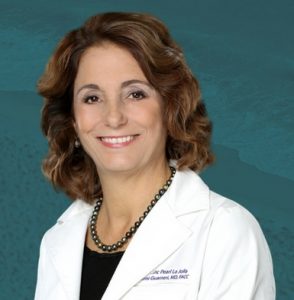How Climate Affects Our Health
 Mimi Guarneri, MD, a founding board member of the American Board of Integrative Medicine® (ABOIM®), was interviewed in the April 2018 issue of Integrative Medicine: A Clinician’s Journal (IMCJ) about the effects of climate change on our health. Dr. Guarneri is the private physician of Veerabhadran Ramanathan, PhD, who is a climate scientist at the Scripps Oceanographic Institute, a chief scientific advisor for Pope Francis, and a member of the Pontifical Academy of Science (PAS). In November 2017, Dr. Guarneri attended a climate change conference organized by the PAS, and came away with valuable insight into how climate change affects human health.
Mimi Guarneri, MD, a founding board member of the American Board of Integrative Medicine® (ABOIM®), was interviewed in the April 2018 issue of Integrative Medicine: A Clinician’s Journal (IMCJ) about the effects of climate change on our health. Dr. Guarneri is the private physician of Veerabhadran Ramanathan, PhD, who is a climate scientist at the Scripps Oceanographic Institute, a chief scientific advisor for Pope Francis, and a member of the Pontifical Academy of Science (PAS). In November 2017, Dr. Guarneri attended a climate change conference organized by the PAS, and came away with valuable insight into how climate change affects human health.
In her interview with IMCJ, she spoke of the link between climate change and poverty, specifically that the people who will be most affected by the climate crisis are 3.1 billion of the world’s poorest. As Dr. Guarneri explained, the poorer you are the less likely you are to have an air conditioner, a house, or even somewhere to take refuge during a crisis. For example, in 2015, when the temperatures in Karachi, Pakistan soared to 120 degrees Fahrenheit, about 200 people died from heat stroke or dehydration.
Dr. Guarneri said that Dr. Ramanathan returned from the PAS conference with a plan for a summit of international leaders to address the threat that climate change poses to the world’s poor. The summit would tackle issues such as air pollution and sustainable agriculture.
Climate change and its causes have enormous implications for human health, Dr. Guarneri told IMCJ. For instance, at the PAS conference, the World Health Organization pointed out that air pollution is now recognized as the main cause of stroke and is an independent risk factor for cardiovascular disease. Also, as the climate warms up, vector-borne illnesses like Zika, dengue fever, and Lyme disease, which are more common in the tropics, will move northward. Moreover, with warmer weather comes longer hatching periods for the mosquitos that transmit many of these illnesses. Drought, exacerbated by climate change, is also a major worry, Dr. Guarneri said. Drought conditions in northern African have been so severe that it now endangers food production for millions of people.
She emphasized that, when it comes to human health, clinicians should distinguish between climate change and the weather. A two-degree difference in the weather from one day to the next is not the issue; the warming trend over time and its health implications are what we should be concerned about. Clinicians need to educate their patients about this and other issues related to climate change so that we can all take collective action, she said.
The American Board of Physician Specialties® commends Dr. Guarneri for her unceasing efforts to raise awareness about the effects of global climate change on human health. We champion the integrative approach of our Member Board, the ABOIM®, which focuses on optimal health by taking into account a patient’s environment and treating the root causes of illnesses instead of the symptoms. For more information about the ABOIM®, contact the ABPS today.






